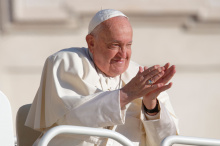Message of the Holy Father for the 59th World Day of Social Communications, 24.01.2025
The following is the Message of the Holy Father Francis for the 59th World Day of Social Communications, on the theme: “Share with gentleness the hope that is in your hearts (cf. 1 Pet 3:15-16)”:
Message of the Holy Father
Share with gentleness the hope that is in your hearts (cf. 1 Pet 3:15-16)
Dear brothers and sisters!
In these our times, characterized by disinformation and polarization, as a few centres of power control an unprecedented mass of data and information, I would like to speak to you as one who is well aware of the importance – now more than ever – of your work as journalists and communicators. Your courageous efforts to put personal and collective responsibility towards others at the heart of communication are indeed necessary.
As I reflect on the Jubilee we are celebrating this year as a moment of grace in these troubled times, I would like in this Message to invite you to be “communicators of hope”, starting from a renewal of your work and mission in the spirit of the Gospel.
Disarming communication
Too often today, communication generates not hope, but fear and despair, prejudice and resentment, fanaticism and even hatred. All too often it simplifies reality in order to provoke instinctive reactions; it uses words like a razor; it even uses false or artfully distorted information to send messages designed to agitate, provoke or hurt. On several occasions, I have spoken of our need to “disarm” communication and to purify it of aggressiveness. It never helps to reduce reality to slogans. All of us see how – from television talk shows to verbal attacks on social media – there is a risk that the paradigm of competition, opposition, the will to dominate and possess, and the manipulation of public opinion will prevail.
There is also another troubling phenomenon: what we might call the “programmed dispersion of attention” through digital systems that, by profiling us according to the logic of the market, modify our perception of reality. As a result, we witness, often helplessly, a sort of atomization of interests that ends up undermining the foundations of our existence as community, our ability to join in the pursuit of the common good, to listen to one another and to understand each other’s point of view. Identifying an “enemy” to lash out against thus appears indispensable as a way of asserting ourselves. Yet when others become our “enemies”, when we disregard their individuality and dignity in order to mock and deride them, we also lose the possibility of generating hope. As Don Tonino Bello observed, all conflicts “start when individual faces melt away and disappear”.[1] We must not surrender to this mindset.
Hope, in fact, is not something easy. Georges Bernanos once said that, “only those are capable of hope, who have had the courage to despair of the illusions and lies in which they once found security and which they falsely mistook for hope... Hope is a risk that must be taken. It is the risk of risks”.[2] Hope is a hidden virtue, tenacious and patient. For Christians, it is not an option but a necessary condition. As Pope Benedict XVI noted in the Encyclical Spe Salvi, hope is not passive optimism but, on the contrary, a “performative” virtue capable of changing our lives: “The one who has hope lives differently; the one who hopes has been granted the gift of a new life’ (No. 2).
Accounting with gentleness for the hope that is in us
In the First Letter of Peter (3:15-16), we find an admirable synthesis in which hope is linked to Christian witness and communication: “In your hearts sanctify Christ as Lord. Always be ready to make your defense to anyone who demands from you an accounting for the hope that is in you; yet do it with gentleness and reverence”. I would like to dwell on three messages that we can glean from these words.
“In your hearts sanctify Christ as Lord”. The hope of Christians has a face, the face of the risen Lord. His promise to remain always with us through the gift of the Holy Spirit enables us to hope even against all hope, and to perceive the hidden goodness quietly present even when all else seems lost.
The second message is that we should be prepared to explain the hope that is in us. Significantly, the Apostle tells us to give an accounting of our hope “to anyone who demands” it. Christians are not primarily people who “talk about” God, but who resonate with the beauty of his love and a new way of experiencing everything. Theirs is a lived love that raises the question and calls for an answer: Why do you live like this? Why are you like this?
In Saint Peter’s words, we find, finally, a third message: our response to this question is to be made “with gentleness and reverence”. Christian communication – but I would also say communication in general – should be steeped in gentleness and closeness, like the talk of companions on the road. This was the method of the greatest communicator of all time, Jesus of Nazareth, who, as he walked alongside the two disciples of Emmaus, spoke with them and made their hearts burn within them as he interpreted events in the light of the Scriptures.
I dream of a communication capable of making us fellow travelers, walking alongside our brothers and sisters and encouraging them to hope in these troubled times. A communication capable of speaking to the heart, arousing not passionate reactions of defensiveness and anger, but attitudes of openness and friendship. A communication capable of focusing on beauty and hope even in the midst of apparently desperate situations, and generating commitment, empathy and concern for others. A communication that can help us in “recognizing the dignity of each human being, and [in] working together to care for our common home” (Dilexit Nos, 217).
I dream of a communication that does not peddle illusions or fears, but is able to give reasons for hope. Martin Luther King once said: “If I can help someone as I pass along, if I can cheer somebody with a word or song... then my living will not be in vain”.[3] To do this, though, we must be healed of our “diseases” of self-promotion and self-absorption, and avoid the risk of shouting over others in order to make our voices heard. A good communicator ensures that those who listen, read or watch can be involved, can draw close, can get in touch with the best part of themselves and enter with these attitudes into the stories told. Communicating in this way helps us to become “pilgrims of hope”, which is the motto of the present Jubilee.
Hoping together
Hope is always a community project. Let us think for a moment of the grandeur of the message offered by this Year of Grace. We are all invited – all of us! – to start over again, to let God lift us up, to let him embrace us and shower us with mercy. In this regard, the personal and communal aspects are inseparably connected: we set out together, we journey alongside our many brothers and sisters, and we pass through the Holy Door together.
The Jubilee has many social implications. We can think, for example, of its message of mercy and hope for those who live in prisons, or its call for closeness and tenderness towards those who suffer and are on the margins. The Jubilee reminds us that those who are peacemakers “will be called children of God” (Mt 5:9), and in this way it inspires hope, points us to the need for an attentive, gentle and reflective communication, capable of pointing out paths of dialogue. For this reason, I encourage you to discover and make known the many stories of goodness hidden in the folds of the news, imitating those gold-prospectors who tirelessly sift the sand in search of a tiny nugget. It is good to seek out such seeds of hope and make them known. It helps our world to be a little less deaf to the cry of the poor, a little less indifferent, a little less closed in on itself. May you always find those glimmers of goodness that inspire us to hope. This kind of communication can help to build communion, to make us feel less alone, to rediscover the importance of walking together.
Do not forget the heart
Dear brothers and sisters, in the face of the astonishing achievements of technology, I encourage you to care for your heart, your interior life. What does that mean? Let me offer you a few thoughts.
Be meek and never forget the faces of other people; speak to the hearts of the women and men whom you serve in carrying out your work.
Do not allow instinctive reactions to guide your communication. Always spread hope, even hen it is difficult, even when it costs, even when it seems not to bear fruit.
Try to promote a communication that can heal the wounds of our humanity.
Make room for the heartfelt trust that, like a slender but resistant flower, does not succumb to the ravages of life, but blossoms and grows in the most unexpected places. It is there in the hope of those mothers who daily pray to see their children return from the trenches of a conflict, and in the hope of those fathers who emigrate at great risk in search of a better future. It is also there in the hope of those children who somehow manage to play, laugh and believe in life even amid the debris of war and in the impoverished streets of favelas.
Be witnesses and promoters of a non-aggressive communication; help to spread a culture of care, build bridges and break down the visible and invisible barriers of the present time.
Tell stories steeped in hope, be concerned about our common destiny and strive to write together the history of our future.
All this you can do, and we can do, with God’s grace, which the Jubilee helps us to receive in abundance. This is my prayer, and with it, I bless each of you and your work.
Rome, Saint John Lateran, 24 January 2025, Memorial of Saint Francis de Sales
FRANCIS


